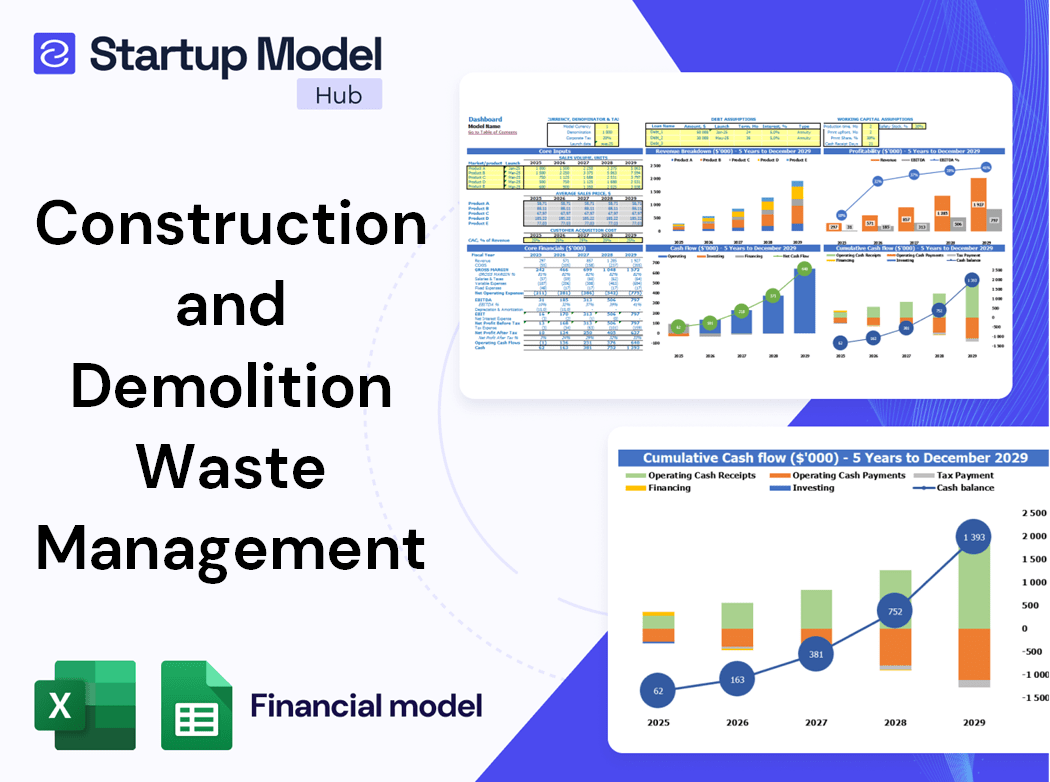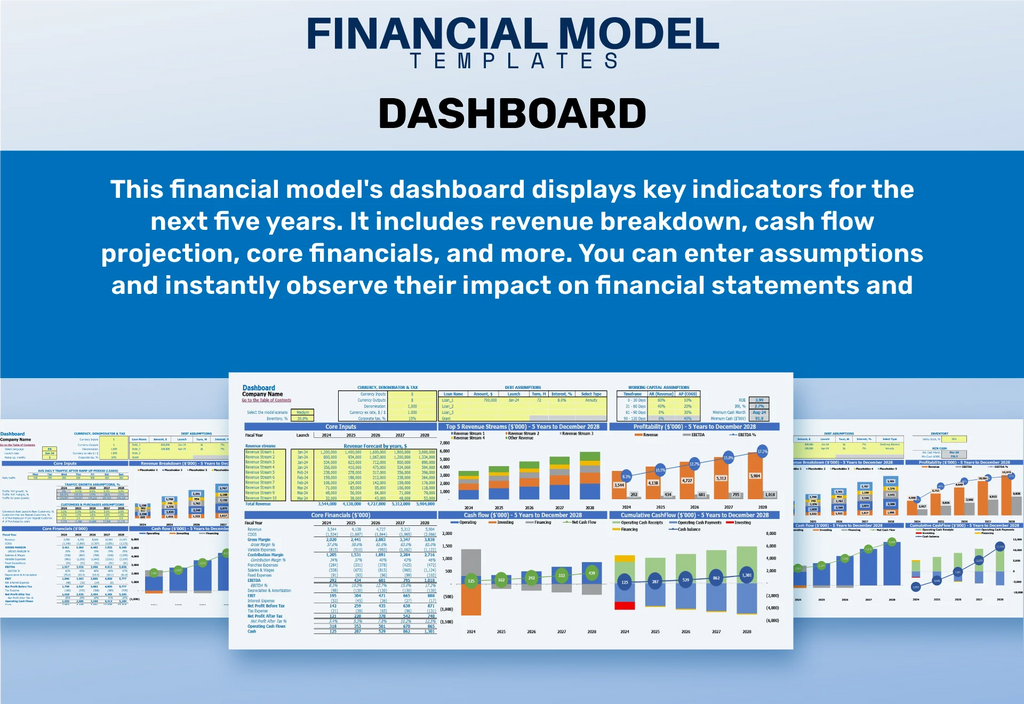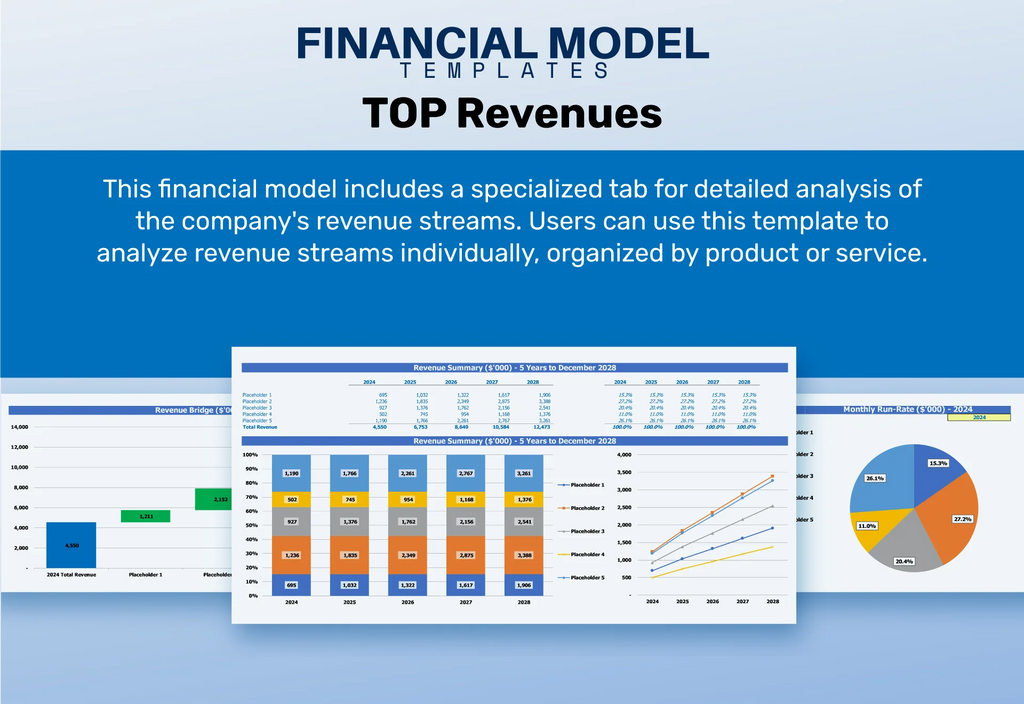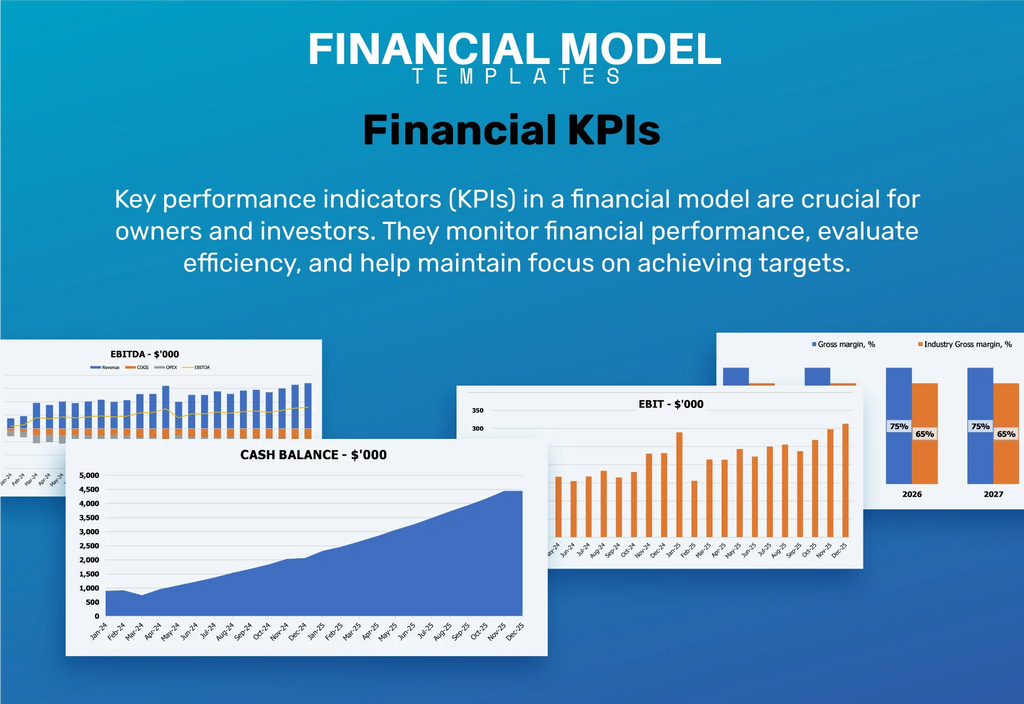Construction And Demolition Waste Management Financial Model

5-Year Financial Projections
100% Editable
Investor-Approved Valuation Models
MAC/PC Compatible, Fully Unlocked
No Accounting Knowledge Needed
Construction And Demolition Waste Management Financial Model
Bundle Includes:
-
Financial Model
-
Business Plan
-
Pitch Deck
-
Financial Dashboard
ALL IN ONE MEGA PACK - CONSIST OF:
construction and demolition waste management Financial Model/Business Plan Excel Template
Pitch Deck Template For PowerPoint, Keynote & Google Slides
Business Plan Guide and Business Plan Template in MS Word Format
Financial Dashboard in Excel To Track Your Business Performance
CONSTRUCTION AND DEMOLITION WASTE MANAGEMENT FINANCIAL MODEL FOR STARTUP INFO
Highlights
The development of effective construction waste management strategies is crucial for enhancing project profitability and sustainability in the industry. By employing demolition debris recycling techniques and conducting a thorough financial analysis of waste management, contractors can better understand the economic benefits of waste recycling and its impact on project ROI. Integrating waste reduction financial modeling and cost-benefit analysis in demolition projects facilitates informed decision-making, aligning with regulatory compliance in demolition practices. Furthermore, the adoption of sustainable construction practices, coupled with robust recycling programs for construction waste, not only lowers operational costs but also attracts green building financial incentives. Proper project lifecycle cost estimation and contractor waste management responsibilities ensure that investments in waste management yield long-term benefits, thereby promoting environmental impact assessment and financial forecasting for waste operations.
The construction and demolition waste management financial modeling Excel template addresses several pain points for buyers by providing a comprehensive forecasting tool that streamlines financial analysis of waste management operations over a 60-month period. By offering detailed projections for revenue and expenses through monthly and annual profit and loss statements, cash flow statements, and balance sheets, it simplifies project lifecycle cost estimation and enhances financial planning in construction projects. The inclusion of sales analysis and feasibility matrices aids in evaluating the economic benefits of waste recycling and the impact of waste management on project ROI. Additionally, the template's diagnostic tools and risk identification features support better regulatory compliance in demolition, while exploring various financing options, including equity funding, thus providing a holistic approach to contractor waste management responsibilities and capital investment in waste management initiatives.
Description
Our construction and demolition waste management financial model Excel template offers comprehensive analysis and calculations vital for operational management, investor insights, and financial assessments. Designed to facilitate informed business and financial decisions, this model includes a detailed five-year cash flow projection, allowing businesses to identify the necessary initial capital investments and working capital requirements crucial for financial sustainability. Additionally, it streamlines the forecasting of monthly sales and expenses, enabling better financial planning throughout the project lifecycle. By generating 60-month financial statements, such as pro forma income statements and balance sheets, the template helps assess key metrics—including the impact of waste management on project ROI and cost-benefit analysis in demolition projects—while accounting for regulatory compliance and sustainable construction practices.
CONSTRUCTION AND DEMOLITION WASTE MANAGEMENT FINANCIAL MODEL REPORTS
All in One Place
For professionals in financial planning and waste management, our budget financial model stands out as the optimal choice. User-friendly and highly adaptable, it allows for the seamless integration of construction waste management strategies and economic benefits of recycling. Tailor each sheet to enhance your analysis, whether you're assessing operational costs or conducting cost-benefit analyses in demolition projects. Ideal for supporting sustainable construction practices, this model empowers you to project lifecycle cost estimation and financial forecasting, ultimately improving project ROI and ensuring regulatory compliance in waste operations. Elevate your waste management projects with our robust financial solution.

Dashboard
A financial projection dashboard is an invaluable tool for construction waste management, facilitating the analysis of financial indicators crucial for effective decision-making. It streamlines the evaluation of waste reduction financial modeling and cost-benefit analysis in demolition projects, helping organizations assess their overall financial health. By providing real-time data on regulatory compliance and waste management operational costs, it supports sustainable construction practices. Transparent financial reporting fosters trust among stakeholders, enhancing collaboration on recycling programs and capital investments in waste management, ultimately driving economic benefits and improving project ROI.

Business Financial Statements
The financial portrait of a construction firm comprises three core statements: 1. **Income Statement**: This outlines revenue and expenses, incorporating depreciation, income taxes, and interest income, crucial for assessing profitability. 2. **Balance Sheet**: A pro forma balance sheet showcases assets, liabilities, and shareholders' equity, ensuring equilibrium through the equation (assets = liabilities + equity). 3. **Cash Flow Statement**: This provides a clear view of cash inflows and outflows, highlighting the financial health and sustainability of the organization. Together, these statements facilitate effective financial planning and reinforce compliance with regulatory standards in waste management.

Sources And Uses Statement
Effective use of funds is crucial for companies, highlighting both funding sources and cash flow direction. In the context of construction, implementing robust construction waste management strategies can significantly enhance financial performance. By adopting demolition debris recycling techniques and sustainable construction practices, businesses can improve their financial analysis of waste management. Incorporating cost-benefit analysis in demolition projects and project lifecycle cost estimation ensures optimal capital investment in waste management, ultimately boosting project ROI. Emphasizing regulatory compliance and contractor waste management responsibilities also helps in developing efficient recycling programs, underscoring the economic benefits of waste recycling for overall financial planning.

Break Even Point In Sales Dollars
The Excel break-even formula offers a structured financial analysis of waste management strategies, calculating profits at various sales levels. It provides insightful metrics on the safety margin, indicating how much sales can decline before losses occur. This critical tool aids in project lifecycle cost estimation and supports effective financial forecasting for waste operations. By understanding these dynamics, businesses can optimize their contractor waste management responsibilities and enhance their overall project ROI, ensuring compliance with regulatory standards while promoting sustainable construction practices and economic benefits through recycling programs.

Top Revenue
Utilizing the Top Revenue tab, you can generate a demand report for your construction and demolition waste management services, showcasing potential profitability. This financial analysis supports future strategic planning by highlighting key revenue drivers. By developing a revenue bridge in Excel, you can track fluctuations in your revenue streams over time, taking into account factors like product volume and pricing. This insightful forecasting aids in resource planning for your sales team, allowing for efficient alignment with demand patterns and optimizing operational costs while enhancing contractor waste management responsibilities.

Business Top Expenses Spreadsheet
Effective financial planning is crucial for fast-growing and startup companies, particularly in managing substantial expenses that must be justified to mitigate losses. Our P&L Excel template categorizes expenses into four distinct segments for clarity and convenience, with additional costs easily allocated to an 'other' category. This strategic breakdown aids in conducting a financial analysis of waste management and enhances project lifecycle cost estimation. By diligently tracking costs, companies can leverage sustainable construction practices and maximize the economic benefits of waste recycling, ultimately driving project ROI and long-term financial success.

CONSTRUCTION AND DEMOLITION WASTE MANAGEMENT FINANCIAL PROJECTION EXPENSES
Costs
Effective financial planning is crucial during the early stages of a construction business. Monitoring start-up costs ensures adequate funding for operations while avoiding unforeseen expenses. Implementing construction waste management strategies, including demolition debris recycling techniques and regulatory compliance in demolition, can significantly enhance cost-efficiency. Our financial forecasting tools, including proforma templates, empower you to regulate operational costs, assess the impact of waste management on project ROI, and capitalize on green building financial incentives, ultimately supporting sustainable construction practices and maximizing long-term economic benefits. Establishing these best practices early can set your business on a path to success.

CAPEX Spending
Capital expenditures (CapEx) calculations are essential for evaluating long-term asset investments that enhance corporate value, particularly in construction. Understanding CapEx in relation to depreciation and overall financial reporting enables business owners and financial analysts to strategically plan for growth and expansion. Our business forecast template includes a dedicated section for CapEx analysis, aiding users in assessing necessary investments in equipment and infrastructure. This understanding is crucial for aligning construction waste management strategies with financial planning, ensuring regulatory compliance while optimizing project ROI and promoting sustainable construction practices.

Loan Financing Calculator
Our advanced financial modeling for startups includes a comprehensive loan amortization schedule, detailing both the principal and interest components. This template calculates your company's payment obligations by integrating essential factors such as the loan amount, interest rate, repayment duration, and payment frequency. It supports informed decision-making in construction waste management strategies, enhancing sustainable practices and optimizing financial outcomes. By aligning with best practices for waste reduction and recycling, startups can maximize their project ROI while ensuring regulatory compliance and minimizing environmental impact. This holistic approach fosters economic benefits through effective waste management.

CONSTRUCTION AND DEMOLITION WASTE MANAGEMENT EXCEL FINANCIAL MODEL METRICS
Financial KPIs
Incorporating internal rate of return (IRR) in startup financial modeling is essential for evaluating construction waste management strategies. IRR represents the interest rate yielding a net present value of zero, providing crucial insights for investors. A higher IRR signifies a more attractive investment, emphasizing the economic benefits of waste recycling and sustainable construction practices. By understanding financial forecasting for waste operations and conducting cost-benefit analyses in demolition projects, stakeholders can enhance project ROI while ensuring regulatory compliance. Effective contractor waste management responsibilities and innovative recycling programs further contribute to operational efficiency and financial success.

Cash Flow Forecast Excel
A comprehensive cash flow forecast is crucial for demonstrating your company's capacity to meet financial obligations. For banks, it’s essential that your startup financial model transparently illustrates projected cash generation, ensuring sufficient liquidity to service loans. Integrating waste management strategies, such as recycling programs and sustainable practices, can enhance project ROI. Conducting a cost-benefit analysis enables informed decisions on capital investment in waste management, while environmental impact assessments underscore regulatory compliance. Ultimately, effective financial planning in waste management not only aligns with contractor responsibilities but also fosters economic benefits through improved recycling techniques.

KPI Benchmarks
This financial plan for our startup includes a dedicated tab for financial benchmarking analysis. This study evaluates performance metrics, enabling a comparison of our results with key industry financial indicators. By conducting this benchmarking analysis, we can effectively assess our competitiveness, operational efficiency, and overall productivity. This insight is vital for optimizing construction waste management strategies, enhancing cost-benefit analysis in demolition projects, and identifying opportunities for sustainable practices. Ultimately, it supports informed financial forecasting, leading to better project lifecycle cost estimation and improved project ROI through strategic waste management.

P&L Statement Excel
One of the most crucial aspects of managing a construction business is effective financial planning. Our automated Excel template simplifies this process, allowing you to effortlessly track income and expenditures. It includes a comprehensive profit and loss statement, enabling you to quickly calculate actual and projected revenues. By integrating construction waste management strategies and cost-benefit analysis, you can enhance project financial forecasting and maximize ROI. Embrace sustainable construction practices and ensure regulatory compliance while minimizing operational costs with our user-friendly tool, designed to empower your financial decision-making.

Pro Forma Balance Sheet Template Excel
The projected balance sheet template serves as a vital tool for assessing your company's financial standing, showcasing total assets, liabilities, and shareholders' equity at a specific time. Whether analyzed monthly, quarterly, or annually, it offers a clear snapshot of financial health. By comparing historical data, you can identify trends and inform strategic decision-making. This template not only aids in financial planning for construction projects, including waste management operational costs, but also enhances your understanding of the economic benefits of sustainable practices and regulatory compliance, ultimately impacting project ROI and financial forecasting for waste operations.

CONSTRUCTION AND DEMOLITION WASTE MANAGEMENT FINANCIAL PROJECTION TEMPLATE VALUATION
Startup Valuation Model
Our pro forma Excel template integrates two robust seed stage valuation methods: discounted cash flow (DCF) analysis and weighted average cost of capital (WACC) calculations. These tools enable a comprehensive financial analysis of waste management strategies in construction projects, highlighting the economic benefits of waste recycling and its impact on project ROI. By utilizing these methods, stakeholders can enhance financial forecasting for waste operations, align with sustainable construction practices, and ensure regulatory compliance in demolition, ultimately paving the way for effective project lifecycle cost estimation and informed financial planning.

Cap Table
The startup financial projection template incorporates essential proformas for calculating discounted cash flows and comprehensive valuations, including sales and earnings before interest and taxes. Business owners can leverage these insights to evaluate exit value and project returns to investors. Additionally, the cap table, while optional, seamlessly integrates with the three-way financial model, ensuring no adverse effects on other calculations. This structured approach aids in effective financial analysis, enhancing decision-making and strategic planning for sustainable construction practices, waste management operational costs, and the economic benefits of recycling programs.

KEY FEATURES
Effective financial modeling in waste management identifies potential cash shortfalls, ensuring smoother project cash flow and enhanced profitability.
The financial model serves as an essential 'early warning system,' enhancing cash flow management and optimizing project ROI in waste management.
Implementing a waste reduction financial model enhances project ROI by minimizing operational costs and maximizing recycling program benefits.
Effective cash flow forecasting empowers businesses to anticipate financial gaps, enabling informed decisions and fostering sustainable growth.
Implementing waste reduction financial modeling enhances cost-benefit analysis, driving economic benefits and improving project ROI through efficient recycling strategies.
Effective financial modeling enhances cash flow forecasting, enabling informed adjustments that optimize construction waste management strategies and improve project ROI.
Implementing waste reduction financial modeling enhances project ROI by optimizing costs and improving sustainability in construction practices.
This innovative financial model enables construction firms to optimize waste management strategies, ensuring cost-effectiveness and sustainable project outcomes.
Implementing financial modeling for waste reduction enhances project ROI by optimizing costs and promoting sustainable construction practices.
Implementing effective waste management financial models enhances project ROI by enabling efficient resource allocation and cost savings in construction.
ADVANTAGES
Implementing a financial model for waste management enhances project ROI by identifying cost-effective recycling programs and sustainable practices.
Implementing a 5-year cash flow projection template enhances financial analysis, optimizing waste management strategies for sustainable construction practices.
A robust financial model enhances decision-making by revealing the economic benefits of waste recycling and improving project ROI.
Effective financial modeling for waste management enhances project ROI by accurately predicting upcoming cash flow and operational costs.
A robust budget financial model ensures you can meet supplier and employee obligations while maximizing project ROI through effective waste management.




